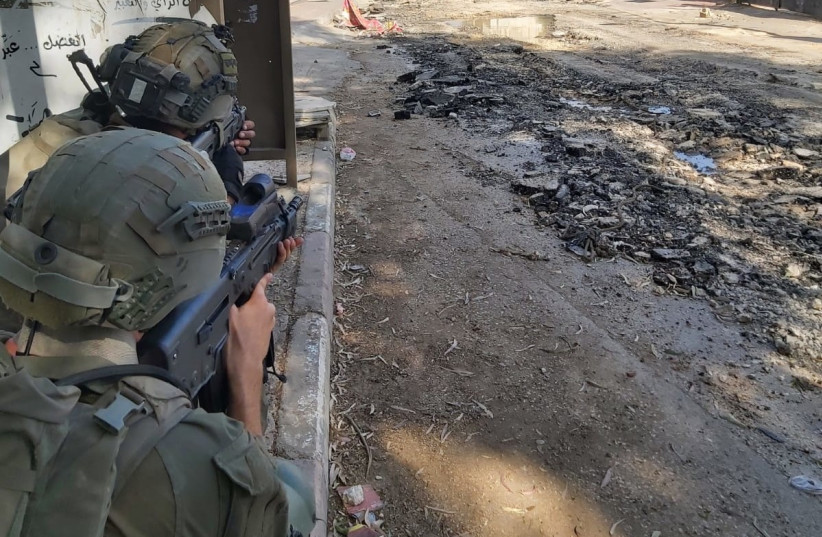During his speech at the Abraham Accords signing ceremony held at the White House, Bahrain’s Foreign Minister Abdullatif al Zayani said that “genuine cooperation is the most effective means to achieve peace.”
This was a vital statement of intent that demonstrated the importance and vitality of peacemaking and diplomacy in our region.
The Abraham Accords have been arguably the greatest diplomatic achievement of the 21st century. It took the bold willingness of several Arab nations, some of whom had for many decades refused to even recognize the State of Israel’s establishment and existence, to step forward and establish full and normal working relations with the Jewish state.
Of course, as anyone who works in the field of international relations knows, diplomacy is an ongoing, complex, and fluctuating process.
Nevertheless, the most important element of strong international friendships and alliances is not only cooperation but understanding, empathy, and a common commitment to achieving a greater good.

If a nation is under threat and attack, a good friend stands by and shows support. In the spirit of the Arab League, Arab nations have largely stood together against those who threaten their common interests. In the spirit of the Abraham Accords, one can reasonably expect the countries similarly to stand together against common enemies.
Unfortunately, in light of recent attacks that have claimed the lives of dozens of Israelis, murdered by multiple genocidal terrorists, our friends among the Abraham Accords nations have been noticeably quiet.
Israel's Abraham Accords allies largely silent amid Palestinian terrorist attacks against Israel
By going into Jenin, the epicenter of terrorism, increasingly bolstered by Iranian largesse in blatant support of terrorist murderers, Israel did what any self-respecting nation must do in defending and protecting the interests of its citizens. Accordingly, Israel took the fight to those who seek violence and bloodshed rather than peace through diplomacy.
It was not an easy operation, but there can be no cities of refuge for terrorists and murderers.
Even though the Biden administration and this Israeli government have not always seen eye to eye, the White House expressed its support for “Israel’s security and right to defend its people against Hamas, Palestinian Islamic Jihad, and other terrorist groups.”
This is the language of friends and allies.
This is the language of a nation and its leadership that knows and understands Israel and the daily challenges it faces.
WE UNDERSTAND the need for Arab solidarity, but there should be no solidarity with terrorists, even implicitly or by omission.
This is not what diplomatic relations should look like.
In 2022, when an Iranian drone attacked Abu Dhabi, the Israeli government did not equivocate: “I strongly condemn today’s drone attack in Abu Dhabi and send my condolences to the families of those killed and my wishes for a speedy recovery to those wounded,” said then-alternate prime minister Yair Lapid at the time. “Israel stands with the United Arab Emirates.”
This is solidarity with friends, allies, and accord partners.
Terrorism is the scourge of all of our societies, and an attack in Tel Aviv, Jerusalem, and Eli, is no different than an attack on Abu Dhabi, Manama, or Rabat.
In fact, the perpetrator is frequently the same, the Islamic Republic of Iran, the world’s worst sponsor of terror.
It is Iran that threatens its Gulf neighbors, that funds Houthi malevolence on the Arabian Peninsula and Hezbollah in Syria and Lebanon, and it is Iran that is behind the surge in attacks on Israeli civilians.
Iranian-backed Palestinian Islamic Jihad chief Ziad Nakhaleh said recently that Supreme Leader Ayatollah Ali Khamenei had personally given his support to establish terrorist cells throughout Judea and Samaria.
Iran, without question, is our mutual enemy, even if it is more recently whispered behind closed doors.
THE SAME Iran that seeks to destroy Israel also seeks to dominate the region and end the rule of pragmatic Sunni nations, especially those brave enough to have joined the circle of peace in the Abraham Accords.
This is not a defining moment for the accords, because they are based on so much more than shared security threats, but they do muddy the water in Jerusalem. They loosen the bonds of fraternity that are being built, create suspicion, and display a marked lack of empathy for a friend and an ally.
The Abraham Accords did away with the idea of the Jewish state as the hidden guest of the region, one you would meet in the middle of the night behind closed doors but deny their existence in the light of day.
Israel is a proud independent nation that values its friends and understands their challenges.
This must be reciprocated.
Israel is already cooperating in significant ways with its new friends in the region, on water and agricultural challenges, on hi-tech and the exchange of knowledge, on solar energy and its storage, and on defense, intelligence, and security.
However, partnerships are a two-way street.
The Jewish state should not be taken for granted.
True solidarity and friendship mean mourning your partner’s losses, standing by and with them, and above all, expressing support and backing when they need to take necessary steps in ensuring the safety and security of their citizens.
In the spirit of the Abraham Accords, it is a common commitment of all its member-states to peacemaking, diplomacy, and solidarity that will lead to regional unity and stability.
The writer is a Los Angeles-based philanthropist and real-estate developer who serves as chairman of the Golda Meir Commemorative Coin Committee, and the Abraham Accords Roundtable. He has been involved for many years in strengthening the US-Israel relationship and was instrumental in the passage of the Iron Dome legislation.
